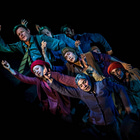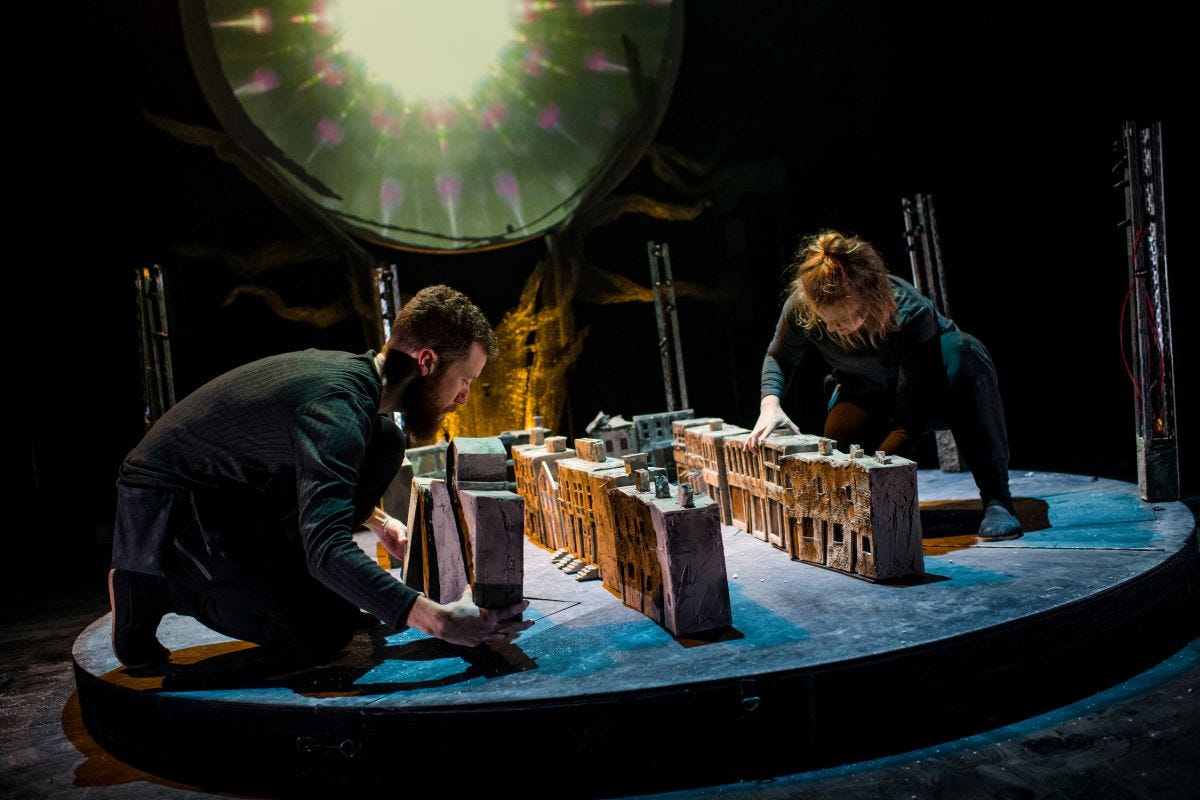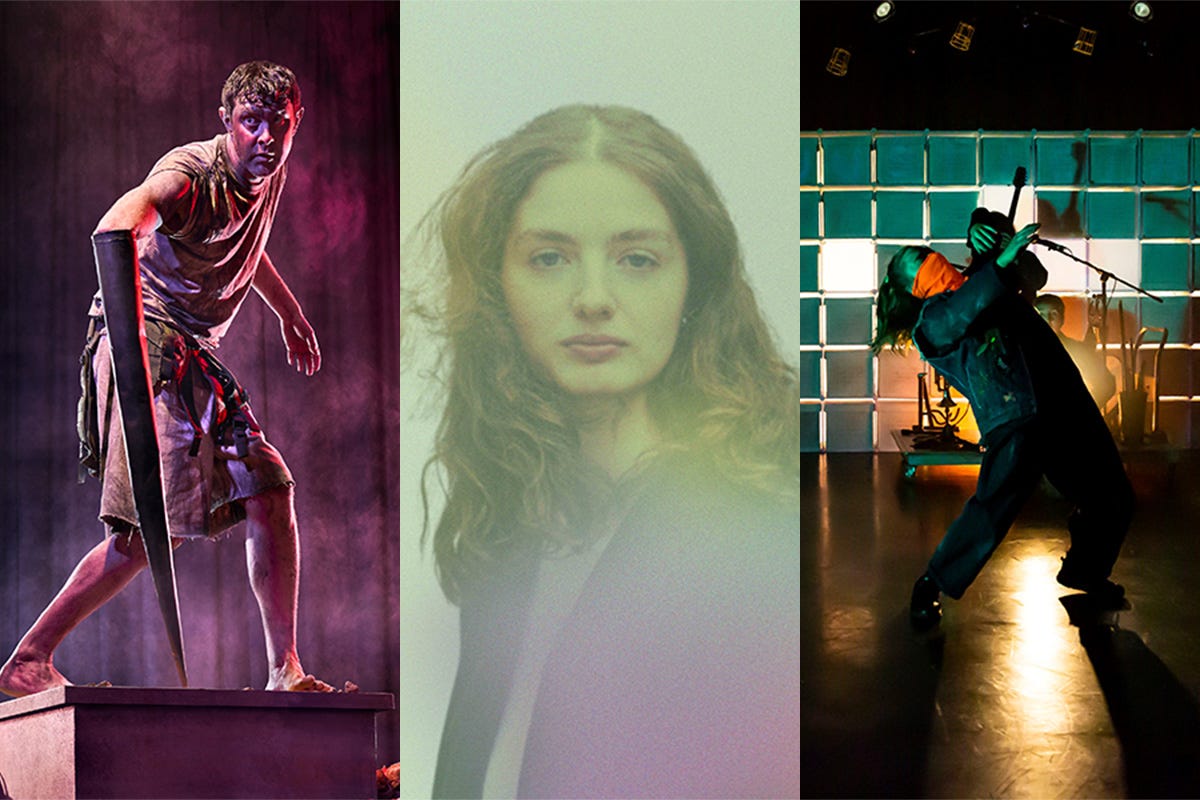The finances of an anonymous freelancer, visual theatre company Tortoise In A Nutshell, and three shows to see...
A freelance lighting designer opens up about their income, expenditure, and career prospects. Plus: the company behind new touring show Ragnarok, three shows to see, and more...
Hello, and welcome to The Crush Bar, a newsletter about theatre written by Fergus Morgan.
This is the fourth issue of 2024 and it features the first piece in a new occasional series I am going to be publishing, which will offer freelance theatremakers the chance to anonymously and honestly discuss their financial situations. See below for more information on that. There is also an interview with Alex Bird, co-founder and co-director of Edinburgh-based visual theatre company Tortoise In A Nutshell, and your regular three show recommendations.
In case you missed it, here is Tuesday’s issue of Shouts And Murmurs, with a round-up of the reviews of Kin, Cowbois, and a few more shows, plus links to some other stuff worth reading.
You can get Shouts And Murmurs straight in your inbox by signing up as a paid supporter of The Crush Bar for £5/month or £50/year. And if you don’t feel like paying but still want to get the newsletter, then just reply to this email saying so, and I will make that happen.
There are a couple more things you can do to support this newsletter: you can share it with anyone you think might enjoy it and encourage them to subscribe, and you can use it for promotional purposes. There is more info about that here. Right, on with this week’s issue…
This is the first instalment in an occasional series of pieces in The Crush Bar exposing and exploring the finances of freelance workers in the theatre industry.
I interview a lot of freelance theatremakers - directors, designers, playwrights, performers, and more - and almost all of them tell me that their career feels unsustainable in the current climate. They work incredibly hard, but freelance fees are so low and reliable employment so scarce, that most struggle to make ends meet. Despite all the talk during the pandemic about rebuilding the theatre industry and taking better care of freelancers, the opposite seems to have happened: freelancers are feeling more financially precarious and more professionally vulnerable than ever.
The ins and outs of this situation have been explored in detail elsewhere - I would recommend this piece by Lyn Gardner in The Stage from last year in response to the alarming results of the most recent Big Freelancer Survey - but I thought I could use this space in The Crush Bar to unveil the personal stories behind the statistics.
The idea, inspired by Lauren Halvorsen and Jenna Clark Embrey’s series bills, bills, bills in Halvorsen’s Substack Nothing For The Group, is to offer a variety of freelancers working in theatre the chance to anonymously and honestly discuss their finances - their income, their expenditure, their leg-ups, their fears, and their frustrations. It is sad but true that people still require anonymity to be open about money matters.
Maybe this series will encourage others to open up about this stuff. Perhaps it might persuade a producer or two to behave differently. At the very least, I hope it offers some insight into the professional realities of freelancing in theatre today.
So, without further ado, here is the first anonymous interviewee…
Who are you?
I am a freelance lighting designer in my late twenties. I am from the North, I trained at a leading London drama school and I am now based in London. Being a lighting designer was my dream since my early teens. I have committed everything to it. I’ve done associate work on a bunch of larger shows and designed the lighting for lots of smaller shows. I’ve been beavering away for nine years in the hope of making it to a more financially secure place.
What is your annual income and where does it come from?
For the tax year ending April 2023, my turnover was £27,000. Once you factor in £10,000 of expenses, my net profit – my income – was £17,000. That was quite a bad year for me. I worked on ten productions that year. Associate work on larger productions pays well, often around £6000, but my personal design work generally pays between £1000 and £3000. The minimum I try to take something on for is £1000.
What do you spend money on, professionally and personally?
My main professional expense is software fees, which are more than £1000. Travel, food, phone bills, and equipment like laptops and iPads make up the rest. They sound like luxuries, but for a designer they are essentials.
Of my £17000 income, a lot goes on rent in London. My partner and I pay £2000 a month between us, so I pay £1000 a month, plus bills, which is bonkers. I don’t have any expensive hobbies. I’ve tightened my belt buckle a lot lately, but I still generally don’t have anything left to save.
What financial assistance have you received?
I’m from a comfortable, middle-class upbringing. I got government loans for university, but my maintenance grant did not cover the extortionate student rent, so my parents gave me a little extra every week so I could afford to live in London while I was a student and for a while afterwards. My grandparents sent me the occasional wad of money during the pandemic, too. I had a really strong year in 2021-22 followed by a bad year in 2022-23, which meant I had a chunky tax bill to pay when I wasn’t earning very much. My parents had to lend me money to pay that. My partner works in the corporate world and is well paid. I’m very anxious about relying on him so I always pay my way. It is like a nice comfort blanket that I have never had to use, but its existence allows me a freedom a lot of people don’t have.
How sustainable is your career currently?
It is fairly unsustainable. I’m in my late twenties and I am already tired. I feel like a lot of the things I liked about the industry have disappeared. The key one was optimism that beavering away at smaller venues would get me somewhere. I don’t feel like that is the case anymore. Additionally, I work 80 hours a week and my income would be naff for a 40-hour week. I no longer want that. It has started to feel stupid. It feels like forty years down the line, I will be sad and poor. I am becoming less willing to break my back for a show to see so little in return.
What would you like to see change for freelancers?
More money and more time. To make a living in this, you have to work multiple shows at once, and that gives you a horrendous feeling of burnout. Being paid better would obviously improve that. Beyond that, I wish us freelancers were more aware of our collective responsibility to support each other on shows. We are all up against it, and I think sometimes we lose sight of the human aspect by putting the show first.
If you are a freelancer working in theatre and would be willing to anonymously feature in The Crush Bar, then please let me know by simply replying to this email.
Alex Bird and his Edinburgh-based visual theatre company Tortoise In A Nutshell are about to stage their biggest show yet: Ragnarok, an epic story of resilience, inspired by Norse mythology, examining modern existential angst, and told using dozens of hand-crafted clay figurines.
“In Norse mythology, Ragnarok is basically the end of the world and its rebirth,” explains Bird. “Its cyclical nature resonated with us a lot. We wanted to explore how individual people connect to big, global events, too, and we thought adapting Ragnarok somehow would be a nice way to do that. The show we have ended up with is inspired by the myth, but it is very much an original story, too.”
The show, which opens in Stirling in early February, then visits Edinburgh’s Manipulate Festival before touring Scotland until the end of March, follows “a young girl’s journey across a world that is in its final days, across a landscape that is falling apart,” explains Bird. It is not intended to be nihilistic or fatalistic, he adds, but to contemplate how individuals can “navigate constant disaster.”
“The world we live in now is dominated by these huge narratives about climate and conflict,” Bird says. “How do you find the strength to continue through all that? We try not to beat people over the head with anything. It is focused on this one girl’s story, but hopefully it acts as a good starting point for people to contemplate that stuff. It is a sad story, but with moments of beauty and hope.”
Ragnarok was originally developed pre-pandemic, during a seven-week residency in an arctic fishing village with Norwegian company Figurteatret I Nordland. It briefly previewed in Stirling in 2020, before Covid put it on hold for nearly four years. The show has evolved throughout that time, and now incorporates live animation, an immersive soundtrack, puppetry, and human performance.
“It’s a pretty big undertaking,” explains Bird. “The biggest thing has been the handmade clay puppets we use. There is about 200 of them, and because they need a uniformity, they all had to be made by one person. Our designer Arran [Howie, co-director of Tortoise In A Nutshell] did all of that. It took her a long time. There are buildings and structures and this diorama, too. We did a lot of storyboarding, which fed into the creation of the puppets, which we brought to life in rehearsal.”
“We have tried hard to organically connect our performance work and our participatory work…”
Bird was born in Cambridge and moved to Edinburgh to study theatre at Queen Margaret University in the late 2000s. It was there that he and Howie founded Tortoise In A Nutshell in 2010 with several other graduates. “We all came from different paths, but we were all passionate about visual theatre,” Bird says. “There were five of us at first. We’ve been whittled down to three since then.”
Over the last fourteen years, the company has made several striking shows telling haunting stories in imaginative ways and collaborating with theatremakers across Scotland and beyond. In 2010 debut The Last Miner, 2012’s Feral, 2015’s The Lost Things, 2016’s Fisk, and 2023’s Concerned Others, Tortoise In A Nutshell have examined everything from mining, to forgetfulness, to drug addiction. Its ever-expanding arsenal of theatrical devices includes everything from movement to microcinema.
“Alongside our performances, we also have a big participatory arm,” Bird adds. “We try to make work with and connect to communities, rather than just turning up for one night, doing a show and disappearing. That side of our work has evolved over time. Before the pandemic, we were on the road a lot. It had begun to feel a bit like a treadmill. So, we did some research studies, working with different social agencies to understand how people’s lives were impacted by theatre, and we have tried hard to organically connect our performance work and our participatory work.”
It is difficult, Bird says, to fund all that activity. Tortoise In A Nutshell is a registered charity but does not receive any regular public funding, despite how many shows it makes and workshops it runs. “We made a decision about six years ago that we would essentially just run as one of Creative Scotland’s Regularly Funded Organisations, even though we weren’t one,” Bird says. “Somehow, we’ve managed to make it work.”
The support of Manipulate Arts, formerly Puppet Animation Scotland and its annual, international festival of visual theatre Manipulate, which runs in Edinburgh in early February, has been essential for Tortoise In A Nutshell, continues Bird, as has the company’s strong relationship with Stirling’s Macrobert Arts Centre.
“Of course, running a company like this comes with sacrifices,” Bird says. “If you can build a sense of community with the people you work with, though, that helps a lot.”
Ragnarok is touring Scotland until March 28. You can find more information here.
Three shows to see next week
Manipulate Festival - various, until February 11
Edinburgh’s annual Manipulate Festival returns next week, brightening up the dark days of early February with its vibrant programme of eclectic, international visual theatre and animation. As well as Tortoise In A Nutshell’s Ragnarok, there is Al Seed’s striking solo show Plinth, Okham’s Razor’s circus Thomas Hardy adaptation Tess, plus new work from Ad Infinitum and Ramesh Meyyappan, and companies from France and Denmark. You can check out the whole programme via the button below.
A Song For Ella Grey - various, until March 16
This is the second literary adaptation written by Zoe Cooper that is touring this Spring, and both will be worth catching. The playwright, who penned hit plays Jess And Joe Forever and Out Of Water, has already reworked Jane Austen’s Northanger Abbey - in Richmond until February 24, then touring until May 24 - and now her version of David Almond’s 2014 novel A Song For Ella Grey is opening at Newcastle’s Northern Stage. Esther Richardson’s Pilot Theatre production then tours to York, Peckham, Hull and Liverpool. You can get tickets via the button below.
Rewind - New Diorama Theatre, until February 10
International company Ephemeral Ensemble’s Rewind is an extraordinary show, exploring stories of human rights abuses in Latin America through a compelling combination of forensic anthropology, puppetry, projection, music, movement and more. I saw it at the Edinburgh Fringe last year and loved it. Director Ramon Ayres featured in The Crush Bar a couple of weeks ago, too. You can read that interview here, and you can book tickets for the show’s London run via the button below.
That’s all for this issue
That is it for this week. If you want to get in touch about anything raised in this issue - or anything at all, really - just reply to this newsletter or email me at fergusmorgan@hotmail.co.uk. Or you can find me on Twitter/X, where I am @FergusMorgan.
A quick reminder of the ways you can support The Crush Bar. You can share it. You can use it for promotional purposes. And you can become a paid supporter, which now means you get an extra weekly email, Shouts and Murmurs, every Tuesday. There are currently 2582 subscribers, 55 of whom are currently paid supporters. If you would like to join them, you can do so above.
Fergus






